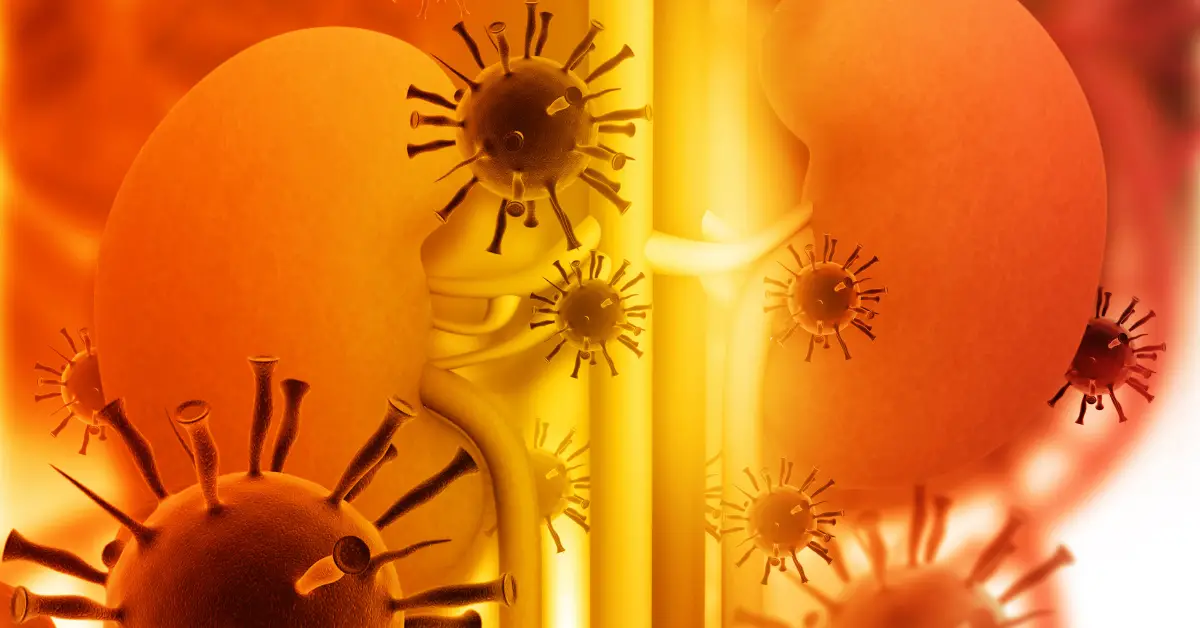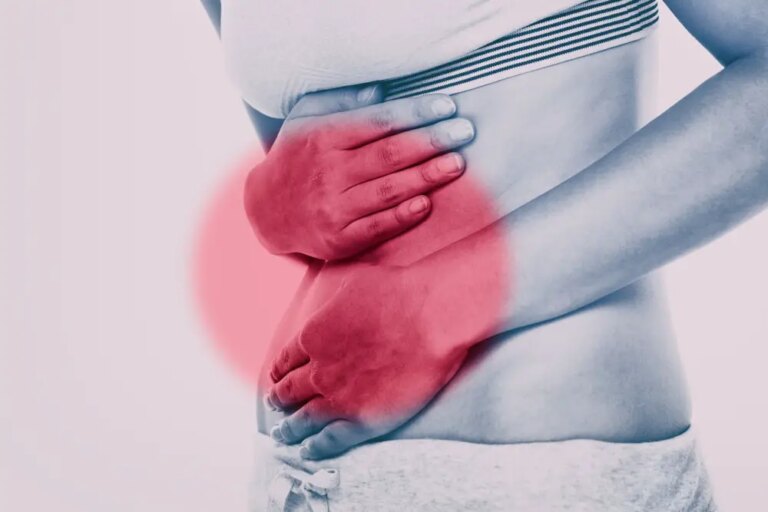Your kidneys keep the makeup of your blood stable, which lets your body work well. Each day, the two kidneys filter blood to remove waste and extra fluid, which leaves the body as urine. A kidney infection is an upper urinary tract infection or UTI. It is caused when bacteria have gotten into your kidneys and caused an infection there. That bacteria usually comes from a different part of your urinary tract, such as the bladder or urethra.
Symptoms Of A Kidney Infection
Symptoms of a kidney infection can start suddenly or develop gradually over a few days. They tend to get slowly worse if not treated.
Symptoms can include:
- Cloudy or bad-smelling urine
- Confusion (in older patients)
- Diarrhea
- Feeling sick or vomiting
- Feeling very weak or tired
- High temperature – 100.4F or above; it may reach 103.1F
- Loss of appetite
- An overwhelming urge to urinate, even when you’ve just done so
- Pain and discomfort in your side, lower back or around your genitals
- Pain when urinating
- Pus (thick, white/yellow liquid) or blood in your urine
- Shivering or chills
- Urinating more often than usual
What Causes A Kidney Infection?
If you suffer from a urinary tract infection, it’s easily treatable and usually not serious or life-threatening. However, if the infection spreads to your kidneys, you end up with a different set of problems to be treated. Kidney infections will usually start as an infection of the bladder or urethra, and then the bacteria will spread to the kidneys.
Cystitis
Cystitis is the name given to an infection of the bladder. This type of infection is usually caused by E. coli bacteria but can be caused by other types as well. E. coli is the culprit about 90 percent of the time. Cystitis can be caused by sexual intercourse, but you don’t have to be sexually active to get it.
Urethritis
An infection of the urethra can occur when gastrointestinal bacteria spread from the anus to the urethra. This is why wiping from the front to the back is so important. For women, because the female urethra is close to the vagina, sexually transmitted infections, such as herpes, gonorrhea, chlamydia, and mycoplasma can also cause urethritis.
Who Is At Risk Of Developing A Kidney Infection?
Sexually active women, pregnant women, and older women all may be at increased risk for a UTI. This is because a woman’s urethra is shorter than a man’s, making it easier for bacteria to reach the kidneys. Frequent sex increases the chance of getting a kidney infection as well. Additionally, people with kidney stones or an abnormality of the kidney are more susceptible to kidney infections. Any illnesses that impair the immune system increase the chance of getting a kidney infection, or a UTI in general, as the body’s defense against germs, is compromised.
Anything that slows the flow of urine, including a kidney stone or an enlarged prostate, can also increase the risk of developing a kidney infection, as can the use of a catheter.
How To Decrease The Risk Of Developing A Kidney Infection
There’s no way to definitively make sure you never get a kidney infection, but some of the things you can do to help decrease the risk of developing a kidney infection are as follows:
- Make sure you stay well hydrated and drink plenty of liquids every day. Frequent urination allows bacteria to be flushed from your urinary tract before an infection can begin.
- Go to the bathroom as soon as you need it — don’t hold it in.
- Always empty your bladder after having sex. This can prevent all types of UTIs.
- Ensure you’re wiping from front to back when going to the bathroom, as this can help prevent bacteria from the anus from spreading to the urethra.
- Treat any constipation as soon as possible. Being constipated can increase your chance of developing a UTI, which can lead to a kidney infection.
- Avoid using strongly scented feminine products in your genital region, as these can irritate the urethra.
Complications Of A Kidney Infection
A kidney infection, if not treated quickly and effectively, can permanently damage your kidneys, often through scarring. In the most severe cases, the bacteria can spread to your bloodstream and cause a life-threatening infection or septicemia (blood poisoning).
Another complication of an untreated kidney infection could be the development of a kidney abscess — a collection of pus that forms within the kidney.
If you are pregnant and develop a kidney infection, it can lead to complications for both yourself and your baby, with the risk of your baby being born early and/or underweight.
Most of the time, people with a kidney infection will make a full recovery, but there are some situations that make the risk of a complication slightly higher.
These include:
- Being over the age of 65
- Being a woman
- Being immunosuppressed — for example, if you have AIDs, are undergoing chemo, etc.
- Having poorly controlled diabetes
- Having kidney stones
- Having other issues with your kidneys already
How Is A Kidney Infection Diagnosed?
To determine if you have a kidney infection, your doctor will ask about your symptoms and recent medical history.
Your doctor will likely first perform a urine test to see if you have a UTI. This involves analyzing the urine to look for blood or bacteria in the urine. To avoid potential contamination of the sample, you may be instructed to first wipe your genital area with an antiseptic pad and to collect the urine midstream.
To check if there is a blockage of some sort causing the kidney infection, you may have to have tests other than a urine test. Other tests might include an ultrasound, CT scan, or a type of X-ray called a voiding cystourethrogram. A voiding cystourethrogram involves injecting a contrast dye to take X-rays of the bladder when full and while urinating.
Methods For Treating A Kidney Infection
Antibiotics for Kidney Infection
Antibiotics are the usual treatment for a kidney infection, and the length of treatment is dependent on the severity of the infection. For an uncomplicated UTI, a 3 to 7-day course of antibiotics will do the trick. For recurrent or more serious infections, treatment may be extended to 10 to 14 days. Regardless of the length of treatment, make sure you always take the full course of antibiotics as prescribed by your doctor to ensure the infection doesn’t come back. Even if you feel much better, it’s imperative that you continue the course of medication until the end.
For a very severe UTI, you may need treatment with intravenous antibiotics in a hospital, but most of the time it won’t come to that.
Cranberries/ Cranberry Juice for Kidney Infection
Cranberries as a treatment for UTIs in general, or more specifically kidney infections, is widely disputed. General consensus is that there isn’t enough evidence out there yet to definitively suggest that cranberries can cure UTIs, but that there isn’t enough out there to definitively suggest that it doesn’t have any effect either. Most people believe that, because it does no harm to consume cranberry juice anyway, if you feel like it does you good, go for it.
The same goes for cranberry in tablet form. A lot of people feel like they help stave off kidney infections, and because there’s no downside to taking them, most doctors won’t tell you not to. However, be mindful about the high calories in cranberry juice. Be careful not to overindulge, and be careful of the acidity if you suffer from any gastrointestinal issues.
Preventing Recurring UTIs for Kidney Infection
Vaginal estrogen cream also may prevent recurrent UTIs in postmenopausal women.
If you find that you keep developing urinary infections, your doctor may prescribe you a low dose of antibiotics to take regularly. This may help to prevent the infection from returning or prevent an infection from spreading to the kidneys.
If your infections are related to sexual activity, you may be prescribed antibiotics to take as a single dose after each occasion of sexual intercourse.
Surgery for Kidney Infection
If tests show that you have a blocked ureter or kidney — if you have a kidney stone for example — you may need an operation to remove it.
Heat for Kidney Infection
Applying a heating pad to your side or back can help ease the pain of a kidney infection while you wait for the antibiotics to start working.
Painkillers for Kidney Infection
To alleviate the pain of a kidney infection, you can also use over-the-counter pain relievers such as acetaminophen or ibuprofen. These can also be used to help reduce a fever.
Frequently Asked Questions About A Kidney Infection
Q. Does a kidney infection have another name?
A. Yes, the technical name for it is pyelonephritis.
Q. How common are kidney infections?
A. Kidney infections cause most of the 100,000 hospital visits for UTIs in the United States each year.
Q. Can my eating, diet, and nutrition help prevent kidney infections?
A. There’s no definitive evidence to suggest that diet and nutrition can help prevent kidney infections, but there is currently research being undertaken to find out if cranberry, either in juice or pill form, can help prevent kidney infections from occurring. The main thing you can do, with regards to your diet and nutrition, ensures that you drink plenty of water as this can help flush out any bacteria lurking around.
Q. How can I make sure my kidney infection is completely gone?
A. First of all, always make sure that you take the full course of any antibiotics given to you by your doctor, even if you feel completely well before the course ends. Secondly, your doctor can run more tests on your urine to check that the infection has cleared.
Q. How much more likely are women to develop kidney infections than men?
A. Women are much more likely to develop a kidney infection than men; around 50–60% of women will develop UTIs in their lifetimes.
If you ever have any serious concerns or suspicions you may have a UTI, be sure to consult your doctor.
Do you have any additional questions about kidney infections that we can help answer?



















